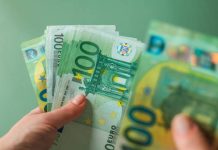- U.S. activates tariffs on Chinese goods, Beijing’s response eyed
- Immediate reaction by major currencies limited
- Focus shifts to U.S. jobs report due later in the day (Updates throughout)
The dollar stood little changed against its peers on Friday and investor caution prevailed with U.S. tariffs on Chinese goods taking effect and market participants turning their attention to the closely-watched U.S. jobs report due later in the day.
The first salvos of a trade conflict between the world’s biggest economic powers were fired on Friday with U.S. tariffs on $34 billion in Chinese goods coming into effect.
Focus now shifts to retaliatory measures China could employ – Beijing said on Friday it had no choice but to fight back against U.S. bullying on trade – and the potential volatility that could cause in the global financial markets.
But the immediate response among major currencies was limited.
“The tariffs did come into effect. But it will take three, six or 12 months before their impact becomes visible, and overall moves in key currency pairs have been subdued with the non-farm jobs report looming ahead,” said Bart Wakabayashi, Tokyo branch manager for State Street Bank and Trust.
The dollar index against at basket of six major currencies was mostly steady at 94.388 after slipping to 94.177, its lowest since June 26, the previous day.
The Australian dollar, considered a liquid proxy to China-related trades, edged up 0.15 percent to $0.7398 after the region’s financial markets greeted the tariff activation with a degree of calm.
Against the safe-haven yen, the greenback inched up 0.05 percent to 110.735 yen.
“Participants will be looking to shift their attention from trade matters to the U.S. non-farm payrolls and if the jobs report is strong, dollar/yen stands poised to rise and break out of its recent range,” said Yukio Ishizuki, senior currency strategist at Daiwa Securities in Tokyo.
The euro was steady at $1.1694 after rising 0.3 percent overnight, when it touched $1.1721, its strongest since June 26. It was on track to end the week little changed.
The single currency gained on Thursday on strong German industrial orders and as Washington softened its trade rhetoric towards European Union automakers.
The U.S. Labor Department is expected to report nonfarm payrolls increased 195,000 in June after surging by 223,000 in May. Monthly average hourly earnings likely rose 0.3 percent, which would lift the annual increase to 2.8 percent from 2.7 percent in May.
The pound was effectively flat at $1.3224. It had risen to a nine-day peak of $1.3275 on Thursday after Bank of England Governor Mark Carney said he was confident an economic slowdown was temporary, but the rise faded on nervousness before Friday’s government meeting on Brexit policy.
China’s yuan was 0.2 percent weaker at 6.6506 per dollar but still some distance from an 11-month low of 6.7204 set on Tuesday.
The yuan had retreated to the 11-month low amid trade concerns before pulling back on assurances by China’s central bank. (Editing by Sam Holmes)













